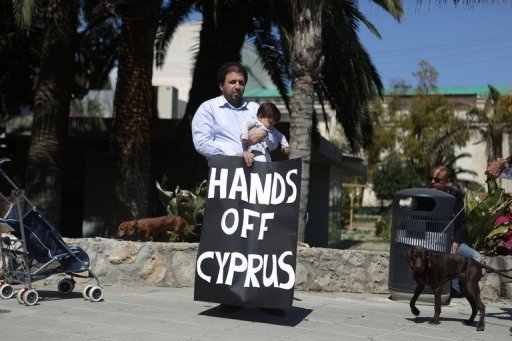Cyprus’ parliament has rejected the controversial levy on bank deposits, proposed as part of an EU-IMF 10 billion-euro ($13 billion) bailout package.
No MPs voted for the bill, with 36 voting against and 19 abstaining.
Cyprus’ finance ministry had modified the package, proposing an exemption for savers with smaller deposits, but opposition had remained fierce.
Thousands of protesters who had filled the streets outside parliament reacted with joy to the news of the vote.
EU finance ministers have warned that Cyprus’ two biggest banks will collapse if the deal does not go through in some form.
However, there has been widespread outrage on the island at the prospect of ordinary savers being forced to pay a levy of 6.75%
The plan was changed to exempt savers with less than 20,000 euros, with those over 100,000 euros charged at 9.9%, but this was not enough to placate critics.
Several MPs during the parliament debate on Tuesday evening denounced the proposed plan as “blackmail”.
President Nicos Anastasiades had urged all parties to back the bailout, saying Cyprus will be bankrupt if the deal does not go ahead.
But he also said earlier on Tuesday that MPs were likely to reject the levy, despite the modifications.
“They feel and they think it’s unjust and that it is against the interests of Cyprus at large. But I have to admit that it was something which was not expected by the troika and by our friends, the Eurogroup.”
The president has called an emergency meeting of political party leaders on Wednesday morning to discuss the way forward.

The president of the Eurogroup of eurozone finance ministers, Dutch Finance Minister Jeroen Dijsselbloem, emphasized on Monday that no other eurozone country would be forced to impose such a levy.
The Cyprus central bank chief, Panicos Demetriades, has warned that scrapping the tax on small savers would scupper the plan to raise 5.8 billion euros in total from bank deposits. He also predicted account holders could suddenly withdraw 10% or more of the total in Cypriot banks if the levy was imposed.
Fearing a run on accounts, Cyprus has shut its banks until at least Thursday. The local stock exchange also remains closed.
Cyprus’ banks were badly exposed to Greece, which has itself been the recipient of two huge bailouts.
Panicos Demetriades said that he favored imposing the levy only on deposits larger than 100,000 euros, with eurozone finance ministers also suggesting such a move.
Instead, they argue that wealthier savers should pay the levy at a higher rate – losing more than 15% of their investments, correspondents say.
However, many of those larger deposits are held by Russians, and Russian leaders have already reacted angrily to the Cypriot levy – on Monday President Vladimir Putin called it “unfair, unprofessional and dangerous”.
Of the estimated 68 billion euros in total held in Cypriot bank accounts about 40% belongs to foreigners – most of them thought to be Russians.
The Cypriot government fears a higher levy on these larger deposits would prompt many large investors to withdraw from the island and would effectively destroy its financial sector.
Russia has also said it may reconsider the terms of a 2.5 billion-euro loan it made to Cyprus in 2011, which was separate from the proposed eurozone bailout.
Cypriot Finance Minister Michalis Sarris arrived in Moscow on Tuesday to see if the repayment on that loan could be delayed until 2020, and whether the interest rate could be reduced.
Officials said he would also be looking for “further investment” in his country, correspondents report, with some speculating this might mean Russian access to Cyprus’ large undeveloped gas deposits.
[youtube ySvxnbWxniE]
